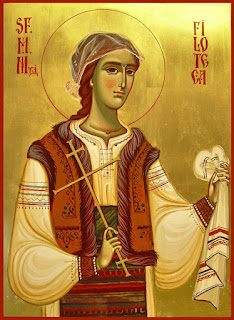"O man, for your sake was Christ born, and the Son of God came that He might make you to live; He became a babe, He became a child, and He became a man, being (at the same time) God in His Nature, and the Son of God."
The Paradise of The Holy Fathers (here).
 Saint Philothea Project is in the final days of preparing to for Kenya Konnection 2017.
Saint Philothea Project is in the final days of preparing to for Kenya Konnection 2017.This means packing bags, How much can we squeeze into two bags and not go over the weight limit. Limiting personal item to the carry on bag only.
Thanks to the many people who have take the opportunity to use the service of Saint Philothea Project to send alms and gift to the orphans, widows and other poor under the care of Orthodox Priest in Kenya. Special thanks to the following who have entrusted us with their alms. By initials only to respect your privacy and anonymity.
SC-200 RH-50 JH-70 KO-25 SS-500
TG-70 SN-100 ID-20 LZ-150 MK-75
GP-50 CW-70 TB-75 TI-30 CW-50
HA-25 DC-275 AT-50 LC-25 RH-100
YA-5 CG-10 CF-20 MN-50 TS-40
OI-5 SR-70 EL-10 JF-50
Also extra thanks to DC for providing 300 Feminine Hygiene Towels for Girls and Young women.
"What shall the tribunal of the Judge be like, when the Nativity of an Infant, makes proud kings tremble? Let kings fear Him, now sitting at the Right Hand of the Father, Whom the impious king feared, while yet at His Mother’s breast".
St. Augustine of Hippo (here).
Please, see
St. Philothea, the Protectress of Romania (from here)
Commemorated on December 7.
 |
| Icon (& more) from here |
The child was often punished by her stepmother, who accused her of being disobedient, and of giving their possessions away to the poor. Her father chastised her for this, but Philothea continued to attend church and do good to others, just as her mother had taught her. As she grew older, she was adorned with the virtues of prayer, virginity, and almsgiving.
St. Philothea would bring food to her father, who was out working in the fields. However, not all of the food would reach him because she would give some of it to the poor children begging in the street. When he complained to his wife that she did not prepare enough food for him, she replied, “I send you plenty of food. Ask your daughter what she does with it.”
Becoming angry with Philothea, her father decided to spy on her to see what happened to the food. From a place of hiding, he saw her giving food to the poor children who came to her. In a violent rage, he took the axe from his belt and threw it at the twelve-year-old girl, hitting her in the leg. The wound was mortal, and she soon gave her pure soul into God’s hands.
Her father was filled with fear and remorse, and tried to lift his daughter’s body from the ground, but it became as heavy as a rock. He then ran to the Archbishop of Trnovo to confess his sin and explain what had happened. The Archbishop and his priests went with candles and incense to take up the martyr’s body and bring it to the cathedral, but they were also unable to lift it.
The Archbishop realized that St. Philothea did not wish to remain in her native land, so he began to name various monasteries, churches, and cathedrals to see where she wished to go. Not until he named the Monastery of Curtea de Argesh in Romania were they able to lift her holy relics and place them in a coffin. The Archbishop wrote to the Romanian Voievode Radu Negru, asking him to accept the saint’s relics. The Archbishop and his clergy carried the holy relics in procession as far as the Danube, where they were met by Romanian clergy, monastics, and the faithful. Her relics were then carried to the Curtea de Argesh Monastery.
Many people have been healed at the tomb of St. Philothea located in a small chapel in the belltower behind the monastery church. Those who entreat her intercession receive help from her. Each year on December 7 there is a festal pilgrimage to the Monastery, and people come from all over Romania. The relics of St. Philothea are carried around the courtyard in procession, and there are prayers for the sick.



Δεν υπάρχουν σχόλια:
Δημοσίευση σχολίου